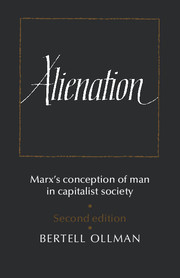From the worker's fourfold alienation in the means of production our investigation branches off in two directions. The first takes us further into economics proper, to the division of labor, private property and, eventually, to Marx's treatment of the economic components of the capitalist system in Capital. The second takes us to other areas of man's life, social intercourse, politics and religion being the most important of these.
Our journey of inquiry will begin with Marx's economics, but, in the present chapter, evidence from Capital will not be used. The Economic and Philosophic Manuscripts of 1844 and other of Marx's early writings contain a great deal of economics which has been clearly fashioned as part of the broader theory of alienation. Capital exhibits the same connections, but they are not made explicit as often as they are in these early works. My aim in this chapter is to lay bare the ties between man's alienation, as described thus far, and the whole sphere of economics. Afterwards, when I come to Marx's chief contribution to economic thought, the labor theory of value, my main source will be Capital.
Engels declares ‘economics deals not with things but with relations between persons, and, in the last resort, between classes; these relations are, however, always attached to things and appear as things’. On this definition, it is man's alienated relations to his activity, products and other men, as expressed in the overt relations between things, that is the subject matter of Marx's economics.
